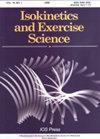Comparison of tensiomyographic contractile properties of the knee muscles between endurance and power athletes
IF 0.7
4区 医学
Q4 ENGINEERING, BIOMEDICAL
引用次数: 0
Abstract
BACKGROUND: Postactivation potentiation (PAP) enhances contractility of skeletal muscle whereas fatigue deteriorates it. Available evidence suggests that the two phenomena may express differently in endurance and power athletes. OBJECTIVE: To compare the patterns of change in knee muscle contractility induced by PAP and fatigue between endurance and power athletes. METHODS: Eleven endurance and ten power athletes (age: 18–33 years) performed isokinetic fatigue and isometric PAP protocols with knee extensors and flexors on computerised dynamometer. Tensiomyography (TMG) of the vastus medialis and semitendinosus muscle medialis was performed before the protocols and during a 10-min recovery. RESULTS: The changes in TMG profile were most pronounced in the vastus medialis of power athletes following the PAP protocol and least pronounced in the semitendinosus of the endurance athletes following the fatigue protocol. The differences between athlete types were most significant for the time-domain TMG parameters of vastus medialis. A significant correlation (r= 0.51–0.73) between the fatigue indices and changes in TMG parameters was observed for the vastus medialis muscle only. CONCLUSIONS: The results show that the TMG patterns of PAP and fatigue in the vastus muscle differ between endurance and power athletes. In this muscle, the changes in TMG parameters are also strongly associated with the degree of fatigue.耐力运动员和力量运动员膝盖肌肉收缩特性的张力肌图比较
背景:激活后增强(PAP)增强骨骼肌的收缩力,而疲劳则使其恶化。现有证据表明,这两种现象在耐力和力量运动员中可能表现不同。目的:比较耐力运动员和力量运动员在PAP和疲劳引起的膝关节肌肉收缩性变化模式。方法:11名耐力运动员和10名力量运动员(年龄:18-33岁)在计算机测功机上对膝关节伸屈肌进行等速疲劳和等速PAP治疗。在手术前和10分钟恢复期间进行股内侧肌和半腱肌内侧肌张力图(TMG)检查。结果:在PAP方案下,力量运动员的股内侧肌的TMG变化最为明显,而在疲劳方案下,耐力运动员的半腱肌的TMG变化最不明显。不同类型运动员的股内侧肌时域TMG参数差异最显著。仅股内侧肌的疲劳指数与TMG参数变化之间存在显著相关(r= 0.51-0.73)。结论:耐力运动员和力量运动员的PAP和股肌疲劳的TMG模式存在差异。在这块肌肉中,TMG参数的变化也与疲劳程度密切相关。
本文章由计算机程序翻译,如有差异,请以英文原文为准。
求助全文
约1分钟内获得全文
求助全文
来源期刊

Isokinetics and Exercise Science
医学-工程:生物医学
CiteScore
1.20
自引率
14.30%
发文量
37
审稿时长
>12 weeks
期刊介绍:
Isokinetics and Exercise Science (IES) is an international journal devoted to the study of theoretical and applied aspects of human muscle performance. Since isokinetic dynamometry constitutes the major tool in this area, the journal takes a particular interest in exploring the considerable potential of this technology.
IES publishes studies associated with the methodology of muscle performance especially with respect to the issues of reproducibility and validity of testing, description of normal and pathological mechanical parameters which are derivable from muscle testing, applications in basic research topics such as motor learning paradigms and electromyography. The journal also publishes studies on applications in clinical settings and technical aspects of the various measurement systems employed in human muscle performance research.
The journal welcomes submissions in the form of research papers, reviews, case studies and technical reports from professionals in the fields of sports medicine, orthopaedic and neurological rehabilitation and exercise physiology.
 求助内容:
求助内容: 应助结果提醒方式:
应助结果提醒方式:


